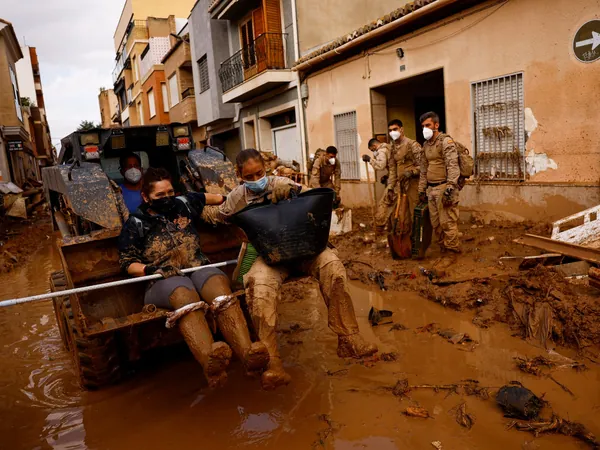
Spain Faces Outrage and Grief After Deadly Flash Floods Claim Over 200 Lives
2024-11-03
Author: Ling
Spain Faces Outrage and Grief After Deadly Flash Floods Claim Over 200 Lives
In a devastating turn of events, eastern Spain has witnessed catastrophic flash floods that have left at least 214 people dead. Five days after this national tragedy, frustration towards the government's response is intensifying, prompting Prime Minister Pedro Sanchez to pledge an improved recovery effort, which includes the deployment of 10,000 soldiers and police officers to assist in the aftermath.
The province of Valencia has borne the brunt of this disaster, with authorities admitting that hopes of rescuing more survivors are dwindling. The flash floods swept away towns, destroyed infrastructure, and tragically claimed the lives of many, with two additional fatalities reported in Castilla La Mancha and one in Andalusia. The situation is grim, with fears rising that more bodies may be trapped within submerged buildings and underground garages.
This catastrophe has now become Europe's most severe flood disaster since the tragic events of 1967 in Portugal, which resulted in at least 500 deaths. In a display of public anger and frustration, residents confronted King Felipe VI, Queen Letizia, and Prime Minister Sanchez during their visit to Paiporta, one of the worst-hit towns, where over 60 lives were lost. As the leaders attempted to meet with victims, mud was thrown at them in protest, and police intervention was necessary to maintain order.
A Flawed Response?
The regional government of Valencia, classified as a level two crisis, is managing the emergency response but has been criticized for previous cuts to emergency services. The President of Valencia, Carlos Mazon of the Popular Party, faced backlash for dissolving the Valencia Emergency Unit last year, which was crucial in responding to natural disasters.
Currently, about 2,000 troops from the Military Emergency Unit, Civil Guard personnel, and national police are working tirelessly alongside thousands of local volunteers, who have come together to assist in rescue operations and clean up efforts. These community members are providing essential supplies and support to those affected by the floods.
Amid the outrage, there is a silver lining as the community rallies together, showing an "enormous" effort to assist victims amid the overwhelming situation. However, worries about disease outbreaks due to stagnant water and unsanitary conditions remain a significant concern.
The Meteorological Catastrophe Explained
The floods were triggered by severe storms concentrated over the Magro and Turia river basins, unleashing volumes of rain that were deemed "extraordinary" by Spain's national weather service. Reports revealed that within a mere eight hours, the Chiva area received more rainfall than it had seen in the last 20 months, catching residents off guard as alerts were issued late.
Experts attribute this disaster partly to climate change, noting that warmer air can hold more moisture, leading to extreme weather events. Scientists have identified a "cut-off lower pressure storm system" linked to an unsettled jet stream as the immediate cause of the calamity. Additionally, the Mediterranean Sea recorded its highest surface temperatures to date in mid-August, which further influenced the intensity of the rainfall.
Unfortunately, Spain's history shows that such extreme weather events are becoming more common. The Mediterranean coast has faced similar occurrences, but this latest episode has eclipsed previous floods in severity. Residents of Paiporta recall the floods of 1957, noting that this current disaster was far worse and has caused sweeping changes to the landscape and infrastructure.
A Call to Action?
As the nation mourns the loss of lives, the call for government accountability and enhanced measures to prevent such tragedies in the future has grown louder. With ongoing discussions about climate change, flood management, and emergency preparedness, Spain faces a critical moment to reassess its approach to natural disasters.
The recovery and rebuilding process will undoubtedly take time, but the need for comprehensive strategies to cope with climate-induced catastrophes is clearer than ever. This disaster serves as a stark reminder of the powerful forces of nature and the dire need for preparedness in the face of increasingly erratic weather patterns.



 Brasil (PT)
Brasil (PT)
 Canada (EN)
Canada (EN)
 Chile (ES)
Chile (ES)
 España (ES)
España (ES)
 France (FR)
France (FR)
 Hong Kong (EN)
Hong Kong (EN)
 Italia (IT)
Italia (IT)
 日本 (JA)
日本 (JA)
 Magyarország (HU)
Magyarország (HU)
 Norge (NO)
Norge (NO)
 Polska (PL)
Polska (PL)
 Schweiz (DE)
Schweiz (DE)
 Singapore (EN)
Singapore (EN)
 Sverige (SV)
Sverige (SV)
 Suomi (FI)
Suomi (FI)
 Türkiye (TR)
Türkiye (TR)